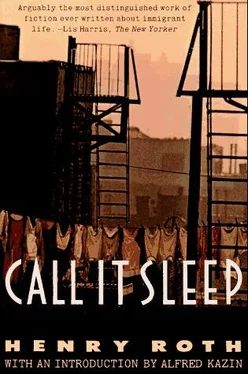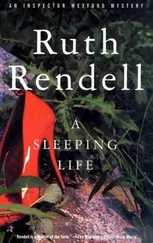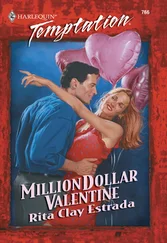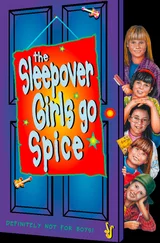Disconsolately he sat down, stretched out athwart the uppermost step of the stoop where the shady threshold of the hallway joined the burning stairs. Just outside the doorway, and under the fierce glare, the horse, black flanks rippling like water, lashed out viciously with hoof and tail at the glinting flies. His straw bonnet with much tossing was awry. Yellow oats, flung up from his feed-bag, lay strewn on the grey-bright gutter. Muted with heat, the city droned remotely. He wished he didn’t have to go.
He had been sitting there for only a few minutes, ferreting about in his mind for some subterfuge, some invulnerable excuse that would prevent his accompanying his father, when the sound of running feet reached him. He looked out on the street. With a shrill cry of “Here’s a wagon!” preceding them, Kushy and another boy ran past the doorway, came to a sudden halt before the milk-wagon.
“Hea’s a good w’eel, Maxey.” Kushy grasped the spokes and squatted down to examine the hub. David noticed that from his hand dangled something that looked like a flat piece of iron tied to a string.
“Yea, a lot!” Maxey, a short stick in his fist, hopped down eagerly beside him.
Prompted more by curiosity than possessiveness, David rose. “Hey, wodda yuh wan’? Dat’s my fodder’s wagon.”
“So wadda yuh hollerin’ about?” Kushy retorted, belligerent after a single glance over his shoulder.
“We ain’ takin’ nott’n.” Maxey explained. “Only grease from de axle.” Industriously he probed the black inside of the hub with the stick.
“Way in deep!” Kushy directed.
“Wotcha gonna do?” David came down the steps.
“We’re goin fishin’.” Maxey drew out a large black gob of grease. “On Tent’ Stritt. We’re potners. We seen id foist.”
“C’mon!” Kushy interrupted him. “Don’ led id flop!”
And with a “No akey! No akey!” flung over their shoulders, the two partners raced toward Avenue D and disappeared around the corner.
Mystified, longing desperately to follow, David stared after them. Half past ten, his father had said. That was a long ways off. He could watch them awhile and be back before his father came down. No one would know. Involuntarily, so it seemed to him, he gravitated toward the corner and went around it. They had said that they would be on Tenth Street, the next block. Should he go that far? At the last moment he decided that he had better not. It was too risky. He would only go as far as the new photography shop in the middle of the block and then return. He peered into the window. It was full of pictures, big and small, bridal pictures, the bride and groom standing stiffly apart despite their apparent closeness, their faces frozen in an impending smile; pictures of prize-fighters crouching in sash and tights; pictures of infants, the little girls seated, holding tiny muffs where the pudgy legs joined the small torso; the little boys always lay on their bellies. And horrible, enlarged pictures of old men and women, colored and acid-clear, the magnified expanse of their brown and sunken cheeks wrinkled the way the wind wrinkles sand. Pictures. Pictures. How did they stretch the big ones out of the little ones? And that bar of glass, that extended across the top of the show window, where did it get that strange green light that changed the color of everyone’s face when one passed it?
He’d better return now. But there was Tenth Street just a little ways off. He would only look once and then go back. Which way?
One glance toward Avenue C sufficed: As many as had been crouching about the pop-corn oven were now clustered before a building this side of the wood-turning shop. He broke into an eager trot, drew up. Most of them were the same boys he had seen a short time ago. Breathless, silent, absorbed, they kneeled on all fours on the iron grate over the cellar. All faces pointed downwards, all eyes riveted on something beneath. Not one looked up when David crawled in among them.
Kushy was doing the fishing. David peered down. Because of the depth of the cellar, it took some time for his eyes to become accustomed to the gloom. But squinting tightly, he at last discerned a something silver glimmering on the grimy cellar floor. Little by little, the gleam settled into the round, smudged surface of a coin. And above it, like a pendulum swinging slowly to and fro, the flat piece of iron hung from Kushy’s hand. His eyes at length completely accustomed to the shadows, David observed that the entire surface of the sinker was daubed with axle grease.
“Leggo now!” someone hissed between the grate. “Now! Id’s righd oveh!”
“Shod op!” Kushy shot back.
As the sinker swung it descended, its area of vibration slowly decreasing. For a moment it hovered directly over the glistening coin — then dropped as if on a prey!
“Easy Kushy!” their admonitions seethed. “Easy! Easy! ’At’s id! Id’ll stick, g’wan! Yuh god it! Betcha million! Slow! Slow!”
“No akey! No akey!” Maxey murmured exultantly.
Pop-eyed, taut with excitement, Kushy hauled in the slack with infinite deliberation. The grease-coated sinker stirred, rose — the coin, smeared now with grease, never budged, but lay where it had lain before. Barbed cackles of derision flew from all but the two partners’ lips.
“I’ll punch yuh innuh nose,” growled Kushy, crimson and bridling.
“Jost you waid!” Maxey spat out venomously. “Ask me fuh sompt’n youse guys. Bubbikiss you’ll ged! G’wan, Kush, you’ll ged it op yet! G’wan!”
The strain broken now, they jabbered turbulently. “See! I tol’ yuh de stuv-iron is hod luck! Yea, yuh shoulda taken somp’n else. Aaa! I coulda god id if yuh did’n holler.”
“You’ll never ged id.” Izzy announced smugly. “Betcha I could ged id.”
“Balls you’ll ged!”
“An I ain’ gonna tell yuh how,” he added spitefully.
“Balls you’ll ged,” repeated Kushy, “an’ a rusky-chooy!”
“Yea?”
“Yea, an’ a bust onna beezer!”
Opposition silenced, Kushy once more lowered the iron shard; once more it dropped only to rise without the coin. He tried again. As often as the grease touched the coin, the latter became a shade darker, a shade more like its surroundings, and by degrees more difficult to distinguish. The minutes passed. While Kushy fished the rest hitched their tongues in tow of their imaginations.
“If it wuz a nickel,” said one broody voice between the gratings, “I could buy fuh two cends cockamamies an’ pud em on mine hull arm. An’ den fuh t’ree cends I’ll go to duh movies.”
“Yuh c’n buy fuh t’ree cends cockamamies.” Izzy crisply revised the dream.
“W’y?”
“Cuz yuh c’n ged in duh movies lods o’ times fuh on’y two cends. Id’s two fuh a nickel ain’ id, fuh kids? Make de odder guy give t’ree cends.”
“Fot smeller,” sneered Kushy vainly lifting the sinker for the twentieth time. The rest brayed their approval.
“Yuh c’n ged in fuh nutt’n wise guy!” another voice affirmed. “Woddayuh tink o’ dat? Yuh jos’ make believe yuh lookin’ on duh pickchiss outside. An’ w’en dat ticket-chopper ain’ lookin’—zoo! Yuh go in — an’ id’s all dock inside.”
“Yea!” Izzy parried. “An’ zoo! If he catches yuh! Wadda roost innee ass he gives. Membuh w’en Hoish god caught? Wuz he cryin’?”
“Make believe w’at I had a nickel,” another rapt voice announced, “so I’ll go to Kaplan’s on Evenyuh C and I’ll buy a tousan’ rubbuh ben’s an’ make a bounceh — a real high bounceh—”
“A lod ain’ good.” Izzy interrupted with authority. “I know somebody, he made a bounceh — bigger’n dis.” His two palms slid through the gratings about a foot apart. “Mor’n’ a zillion rubbuh ben’s he had on id, and id wouldn’t even go high like dis cellah. So he made five liddle ones, an’ duh liddle ones bounced ten flaws w’en he ga’m a good shod.”
Читать дальше












